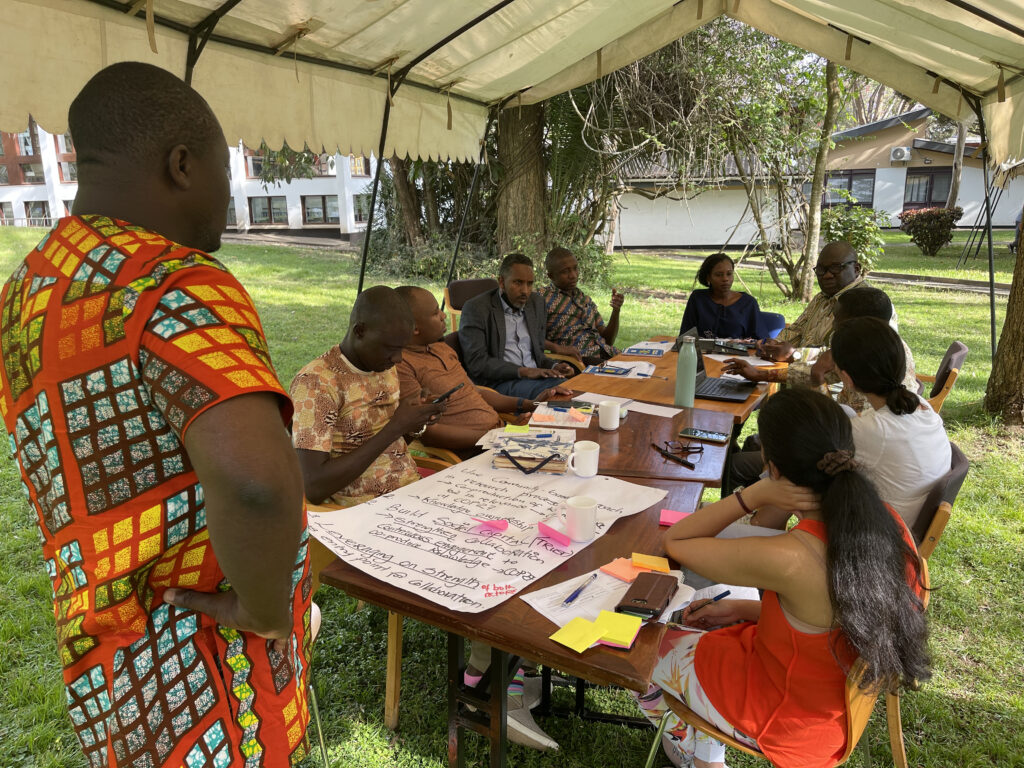African climate researchers and journalists committed to collaborating on climate reporting
22-11-22
Emmanuel Obuobie, Senior Research Scientist at the CSIR Water Research Institute in Ghana, outlines his key takeaways from Danida Fellowship Centre’s “Bridging the Gap. Science for the Public. We focus on the African climate crisis”.
Climate researchers and journalists from across Africa gathered at MS TCDC in Arusha to take part in Danida Fellowship Centre’s timely seminar “Bridging the Gap. Science for the Public. We focus on the African climate crisis”.
By Peter Sanful, Michael Adu, Yaw Agyeman Boafo, and Francis Atube
A report published on 8 September 2022 by the World Meteorological Organisation (WMO) on the state of the climate in Africa, predicts that the ongoing debilitating climate crisis on the African continent will worsen in the coming decades. This will seriously affect African communities, economies, and ecosystems (WMO, 2022). The report concludes, “Climate action is gaining momentum, but more is needed”. Scientists and the media, therefore, have a responsibility to work together harmoniously to ensure that critical climate information is delivered to the public and policymakers in a timely manner.
What better background than this could there be for both journalists and researchers to start bridging the gap between them? To get evidence-based knowledge about climate change out to the populations of Africa it is imperative to remove the barriers that hinder collaboration between the two professions.

A shared and timely platform for science journalism, research engagement, and climate justice
With the aim of paving the way for increased evidence-based and nuanced climate reporting in African media, 21 researchers and 24 journalists from across Africa met at MS TCDC on 31 October – 4 November in Arusha to take part in Danida Fellowship Centre’s seminar Bridging the Gap. Science for the Public. We focus on the African climate crisis.
The participating climate researchers and journalists discussed what they saw to be the greatest challenges to their collaboration as academics and as media professionals. They looked for solutions to overcome them and came up with some key strategies for more extensive science reporting in the media.
The topics discussed included finding a shared African voice for climate justice, science journalism, research engagement, and tactics for networking with stakeholders to enhance communication in research projects. Before the seminar in Arusha, the researchers had drafted – and received feedback on – press releases that outlined key elements of their research. Now the researchers pitched their stories to the journalists with the result that a number of them were featured in the media. Watch SABC News Gearing up for COP27 Climate Talks
The training workshop was timely because it provided a platform for contributing to the climate action agenda and to the advocacy capacities of CSOs, journalists, and scientists attending the UN Climate Change Conference – COP27 – in Sharm El-Sheik, Egypt 6 – 18 November. The agenda and priorities of the African continent and its central policy demands, including the emphasis on loss and damage were also deliberated upon.
Ways to bridge the gap
By the end of the seminar, the researchers and journalists pledged to sustain their collaboration and to work together closely and with a new sense of urgency and purpose to help address the climate crisis on the continent by removing barriers to the representation of climate issues in the media.
As a united group, the researchers and journalists agreed that it is more critical than ever that the relationship between scientists and the media is one of mutual understanding as the threats to human security posed by climate change and the emergence of new pandemics will continue to grow. The gap between scientists and the public has to be bridged in order to avoid misconceptions and fake news.
The world over, scientists and journalists increasingly appreciate the need to build trust and foster a healthy working relationship. Such relationships will help achieve the desired impact: communicating scientific information effectively to the public through the media to stimulate the needed change.
With this renewed commitment from “Bridging the Gap. Science for the Public. We focus on the African climate crisis”, there is hope that a shared voice will amplify the message for urgent climate action in order to avert the looming climate catastrophe for the African continent and sustain the momentum for action as recommended in the WMO report – even after COP27 ends.
The authors
Peter Sanful, Senior Lecturer at the University of Energy and Natural Resources, Ghana is part of the research team behind Building the resilience of Lake Bosumtwi to climate change
Michael Adu, Associate Professor at the University of Cape Coast, Ghana is part of the research team behind Building vegetable farmers resilience to climate change
Yaw Agyeman Boafo, Senior Research Fellow at the University of Ghana is part of the research team behind Coastal community resilience to climate and diarrhoea
Francis Atube, Lecturer, Gulu University, Uganda is part of the research team behind Unlocking the potential of green charcoal in northern Uganda
Emmanuel Obuobie, Senior Research Scientist at Water Research Institute, CSIR, Ghana is part of the research team behind Building climate resilience into basin water management
Go back to our stories